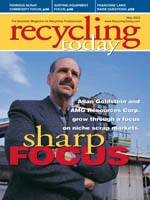N.Y. POLITICIAN INTRODUCES TIRE RECYCLING BILL
New York State Assemblyman Robert Prentiss (R-Colonie) has proposed legislation that would enact the Waste Tire Management and Recycling Act of 2003 to fund state efforts to abate existing scrap tire stockpiles; develop in-state markets for recycling stockpiles and newly generated waste tires; and reimburse local fire districts for tire fires. Additionally, the bill would require state agencies to give due consideration to the use of scrap tires in all appropriate construction and engineering activities that are publicly funded.
The legislation would be funded by $1.75 fee per new passenger car tire. Larger vehicles, including vans and SUVs, would be charged $2 per new tire. This would be an additional fee on top of the tire disposal retailers charge currently.Tire retailers would retain 25 cents of the fee.
The fund is expected to raise $15 million to $17 million annually.
A part of the bill amends the Environmental Conservation Law to require the owner or operator of a facility that stores 1,000 or more tires to provide financial assurance to cover the cost of facility closure once maximum capacity has been reached, in a form and amount acceptable to the Department of Environmental Conservation, before DEC may issue a permit to operate the facility.
PENNSYLVANIA OFFERS RECYCLING GRANTS
Kathleen A. McGinty, acting secretary of the Pennsylvania Department of Environmental Protection, has announced the restoration of Pennsylvania’s municipal recycling grant program. The DEP is offering $20 million this year to help local governments fund their recycling operations.
Awarded under Section 902 of Act 101, known as the Municipal Waste Planning, Recycling and Waste Reduction Act of 1988, the grants help local governments develop and finance recycling programs that can include education, additional curbside collection and recycling-center improvements.
Grant applications will be accepted April 5 through June 26. The DEP will award the grants, which have not been offered in nearly two years, in the fall.
Municipalities are eligible for 90 percent funding of approved recycling program costs. The maximum award for any municipality is $2 million. The highest funding priority will be given to the 42 municipalities mandated to recycle as a result of the 2000 census.
For information on recycling, visit the PA PowerPort at www.state.pa.us, PA Keyword: "recycling."
HAWAII OPENS EPA-FUNDED RECYCLING PLANT
The Hawaii Island Economic Development Board and Recycle Hawaii have announced the grand opening of the "Big Island’s" first solid waste recycling and reuse center.
A $400,000 grant from the U. S. Environmental Protection Agency, administered through the County of Hawaii’s Waste Management Department, funds the center. The Hawaii Island Economic Development Board serves as the project manager.
The center recycles aluminum, office paper, magazines, plastics, cardboard, mixed paper, inkjet and toner cartridges, scrap metal, green waste, newspaper, crayons and glass. The Reuse Center accepts office equipment, consumer electronics, household appliances, furniture and non-vehicular garden tools.
RECYCLING OVERWHELMS FORT WORTH
Fort Worth, Texas, launched a new recycling program March 31. Better-than-expected participation during the first week led to a few glitches, however.
According to the Fort Worth Star Telegram, additional work crews were shifted from garbage to recycling collection, and two crews were brought in from Oklahoma to help staff the recycling routes. Some of these crews were using garbage trucks to collect recyclables; however, the Department of Environmental Management (DEM) assured residents that all recyclables were going to a recycling facility, not to a landfill.
According to the DEM, roughly 65 percent of the city’s residents participated during the first week of the program, compared to a 38 percent participation rate for the city’s earlier program.
The volume of recyclables collected increased because of the growth in participation and the use of larger collection bins. In addition, Fort Worth’s new contract with Abitibi Consolidated allowed for an expansion of acceptable recyclables to include all types of plastic food containers and cardboard packaging. The Abitibi contract also allows for the continued collection of glass, which the company processes for use as aggregate in civil engineering applications.
According to the DEM, the city was pleased with the first week of the new program and expected quick resolution to the initial issues.
The program requires residents to put recyclables into 64-gallon recycling carts and yard trimmings in paper yard bags or tied bundles. The services are designed to improve the city’s 6 percent recycling rate by making recycling easier. Residents are also able to select a smaller garbage cart, thereby saving money on their monthly garbage in this pay-as-you-throw program.

Explore the May 2003 Issue
Check out more from this issue and find your next story to read.
Latest from Recycling Today
- ReMA opposes European efforts seeking export restrictions for recyclables
- Fresh Perspective: Raj Bagaria
- Saica announces plans for second US site
- Update: Novelis produces first aluminum coil made fully from recycled end-of-life automotive scrap
- Aimplas doubles online course offerings
- Radius to be acquired by Toyota subsidiary
- Algoma EAF to start in April
- Erema sees strong demand for high-volume PET systems







